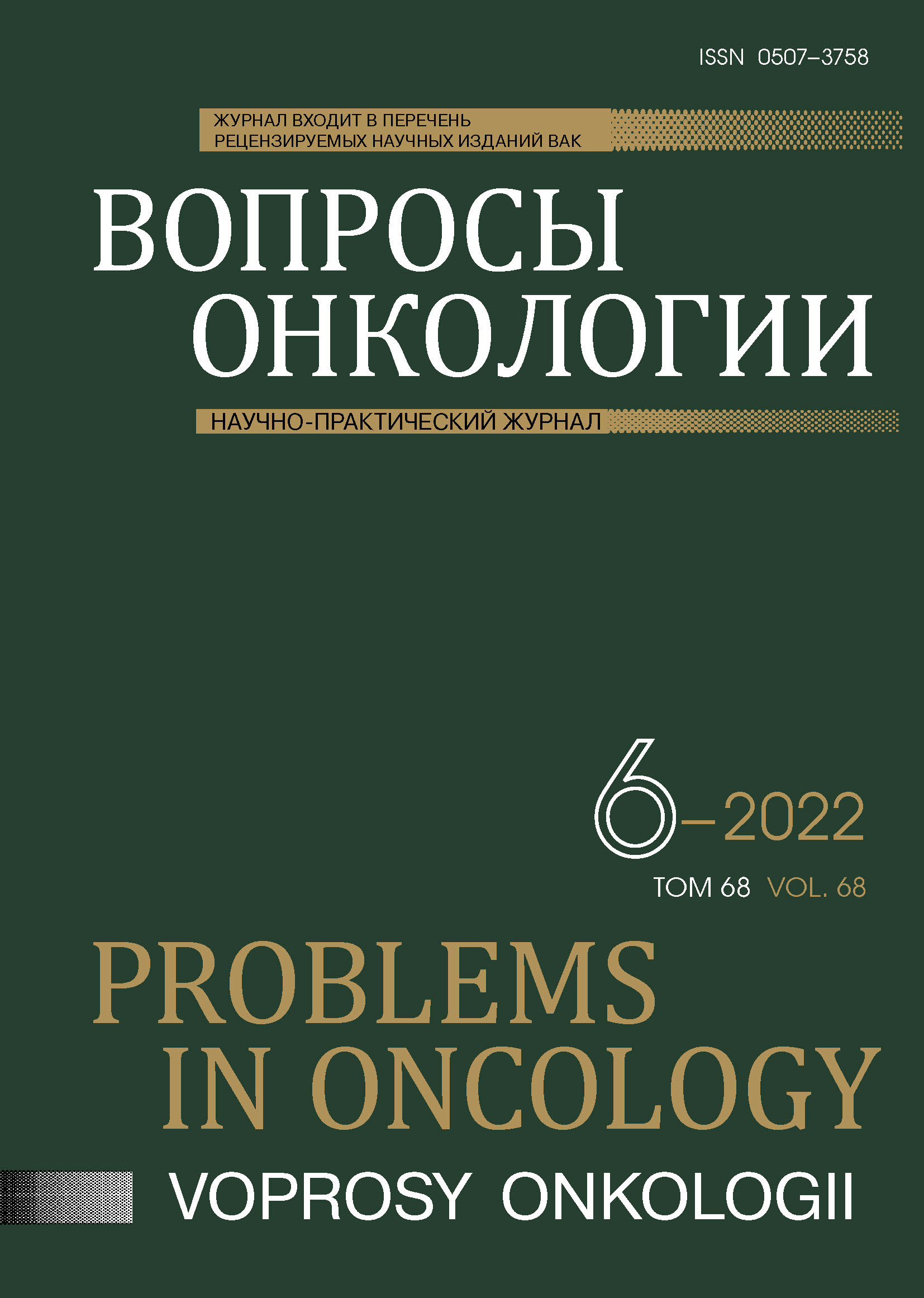Abstract
The choice of optimal drug therapy for cancer patients depends not only on data about the potential clinical efficacy of a given pharmacological substance, but also on a wide range of other attendant, including a list of registered medical indications, costs and actual availability of pharmacological substances. When the use of commonly accepted treatment options is complicated, the oncologists need to look for alternative treatment options with the same efficacy. This paper presents examples of potentially interchangeable antitumor drugs as well as suggests some cost-saving treatment strategies.
References
Государственный реестр лекарственных средств (ГРЛС) [Электронный ресурс]. URL: https://grls.rosminzdrav.ru. (Дата обращения: 03.07.2022) [State Register of Medicinal Remedies (SRMR): [electronic source]. URL: https://grls.rosminzdrav.ru. (Access date: 03.07.2022).
Chic N, Mezquita L, Aldea M et al. Successful Switch to Vemurafenib Plus Cobimetinib After Dabrafenib Plus Trametinib Toxicity in BRAFV600E-Mutant Metastatic Non-Small-Cell Lung Cancer // Clin Lung Cancer. 2021;22(1):e54–e56. doi:10.1016/j.cllc.2020.07.013
García-Foncillas J, Sunakawa Y, Aderka D et al. Distinguishing Features of Cetuximab and Panitumumab in Colorectal Cancer and Other Solid Tumors // Front Oncol. 2019;9:849. doi:10.3389/fonc.2019.00849
Salama H, Fahed Alzayed M, Alharbi KG et al. Erdheim-Chester Disease Successfully Treated with Front-Line Single-Agent Dabrafenib // Am J Case Rep. 2022;23:e935090. doi:10.12659/AJCR.935090
Shiravand Y, Khodadadi F, Kashani SMA et al. Immune Checkpoint Inhibitors in Cancer Therapy // Curr Oncol. 2022;29(5):3044–3060. doi:10.3390/curroncol29050247
Tjulandin S, Demidov L, Moiseyenko V et al. Novel PD-1 inhibitor prolgolimab: expanding non-resectable/metastatic melanoma therapy choice // Eur J Cancer. 2021;149:222–232. doi:10.1016/j.ejca.2021.02.030
Schachter J, Ribas A, Long GV et al. Pembrolizumab versus ipilimumab for advanced melanoma: final overall survival results of a multicentre, randomised, open-label phase 3 study (KEYNOTE-006) // Lancet. 2017;390(10105):1853–1862. doi:10.1016/S0140-6736(17)31601-X
Larkin J, Chiarion-Sileni V, Gonzalez R et al. Combined Nivolumab and Ipilimumab or Monotherapy in Untreated Melanoma // N Engl J Med. 2015;373(1):23–34. doi:10.1056/NEJMoa1504030
Imyanitov E, Sokolenko A. Mechanisms of acquired resistance of BRCA1/2-driven tumors to platinum compounds and PARP inhibitors // World J Clin Oncol. 2021;12(7):544–556. doi:10.5306/wjco.v12.i7.544
Chan CY, Tan KV, Cornelissen B. PARP Inhibitors in Cancer Diagnosis and Therapy // Clin Cancer Res. 2021;27(6):1585–1594. doi:10.1158/1078-0432.CCR-20-2766
Imyanitov EN. Cytotoxic and targeted therapy for BRCA1/2-driven cancers // Hered Cancer Clin Pract. 2021;19(1):36. doi:10.1186/s13053-021-00193-y
Imyanitov EN, Iyevleva AG. Molecular tests for prediction of tumor sensitivity to cytotoxic drugs // Cancer Lett. 2022;526:41–52. doi:10.1016/j.canlet.2021.11.021
Gyawali B. The OlympiAD trial: who won the gold? // Ecancermedicalscience. 2017;11:ed75. doi:10.3332/ecancer.2017.ed75
Cecere SC, Giannone G, Salutari V et al. Olaparib as maintenance therapy in patients with BRCA 1–2 mutated recurrent platinum sensitive ovarian cancer: Real world data and post progression outcome // Gynecol Oncol. 2020;156(1):38–44. doi:10.1016/j.ygyno.2019.10.023
Ramalingam SS, Vansteenkiste J, Planchard D et al. Overall Survival with Osimertinib in Untreated, EGFR-Mutated Advanced NSCLC // N Engl J Med. 2020;382(1):41–50. doi:10.1056/NEJMoa1913662
Hochmair MJ, Morabito A, Hao D et al. Sequential afatinib and osimertinib in patients with EGFR mutation-positive non-small-cell lung cancer: final analysis of the GioTag study // Future Oncol. 2020;16(34):2799–2808. doi:10.2217/fon-2020-0740
Girard N, Moro-Sibilot D, Bouée S et al. Treatment sequence of first and second generation tyrosine kinase inhibitor followed by osimertinib in EGFR-mutated non-small-cell lung cancer: a real life study // Future Oncol. 2020;16(16):1115–1124. doi:10.2217/fon-2020-0084
Ito K, Morise M, Wakuda K et al. A multicenter cohort study of osimertinib compared with afatinib as first-line treatment for EGFR-mutated non-small-cell lung cancer from practical dataset: CJLSG1903 // ESMO Open. 2021;6(3):100115. doi:10.1016/j.esmoop.2021.100115
Duruisseaux M, Besse B, Cadranel J et al. Overall survival with crizotinib and next-generation ALK inhibitors in ALK-positive non-small-cell lung cancer (IFCT-1302 CLINALK): a French nationwide cohort retrospective study // Oncotarget. 2017;8(13):21903–21917. doi:10.18632/oncotarget.15746
Mok T, Camidge DR, Gadgeel SM et al. Updated overall survival and final progression-free survival data for patients with treatment-naive advanced ALK-positive non-small-cell lung cancer in the ALEX study // Ann Oncol. 2020;31(8):1056–1064. doi:10.1016/j.annonc.2020.04.478
Orlov SV, Iyevleva AG, Filippova EA. et al. Efficacy of lorlatinib in lung carcinomas carrying distinct ALK translocation variants: The results of a single-center study // Transl Oncol. 2021;14(8):101121. doi:10.1016/j.tranon.2021.101121
Dummer R, Hauschild A, Santinami M et al. Five-Year Analysis of Adjuvant Dabrafenib plus Trametinib in Stage III Melanoma // N Engl J Med. 2020;383(12):1139–1148. doi:10.1056/NEJMoa2005493
Wu YL, Tsuboi M, He J et al. Osimertinib in Resected EGFR-Mutated Non-Small-Cell Lung Cancer // N Engl J Med. 2020;383(18):1711–1723. doi:10.1056/NEJMoa2027071
Mojtahed SA, Boyer NR, Rao SA et al. Cost-Effectiveness Analysis of Adjuvant Therapy for BRAF-Mutant Resected Stage III Melanoma in Medicare Patients // Ann Surg Oncol. 2021;28(13):9039–9047. doi:10.1245/s10434-021-10288-4
Neal JW, Costa DB, Muzikansky A et al. Randomized Phase II Study of 3 Months or 2 Years of Adjuvant Afatinib in Patients With Surgically Resected Stage I–III EGFR-Mutant Non-Small-Cell Lung Cancer // JCO Precis Oncol. 2021;5:325–332. doi:10.1200/PO.20.00301
Piccart M, Procter M, Fumagalli D et al. Adjuvant Pertuzumab and Trastuzumab in Early HER2-Positive Breast Cancer in the APHINITY Trial: 6 Years' Follow-Up // J Clin Oncol. 2021;39(13):1448–1457. doi:10.1200/JCO.20.01204
Tutt ANJ, Garber JE, Kaufman B et al. Adjuvant Olaparib for Patients with BRCA1- or BRCA2-Mutated Breast Cancer // N Engl J Med. 2021;384(25):2394–2405. doi:10.1056/NEJMoa2105215
Le DT, Durham JN, Smith KN et al. Mismatch repair deficiency predicts response of solid tumors to PD-1 blockade // Science. 2017;357(6349):409–413. doi:10.1126/science.aan6733
Marabelle A, Fakih M, Lopez J et al. Association of tumour mutational burden with outcomes in patients with advanced solid tumours treated with pembrolizumab: prospective biomarker analysis of the multicohort, open-label, phase 2 KEYNOTE-158 study // Lancet Oncol. 2020;21(10):1353–1365. doi:10.1016/S1470-2045(20)30445-9
Alexandrov LB, Nik-Zainal S, Wedge DC et al. Signatures of mutational processes in human cancer // Nature. 2013;500(7463):415–21. doi:10.1038/nature12477

This work is licensed under a Creative Commons Attribution-NonCommercial-NoDerivatives 4.0 International License.
© АННМО «Вопросы онкологии», Copyright (c) 2022
